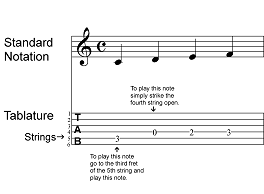It’s time to get into a bit more detail in reading and playing guitar tab or tablature.
First we will start with a diagram and translate this onto the neck of the guitar.
Here are some fretboard diagrams showing you how to play the first four notes shown in the tab shown above.
The first note is played by placing your third finger on the third fret of the fifth string. Remember that the strings are numbered from the the thinnest (1) to the thickest (6).
The next note is played by simply playing the fourth string open. This means you play the string without any fingers on it.
Next you go to the second fret of the fourth string and play this note. Use your second finger to play this note.
The final note is played by going to the third fret of the fourth string and playing this note. Use your third finger to play this note.
How’s that for quick and easy? We will talk more about picking in a later lesson, but for now just use a down-stroke for each note.




Pingback: How to Buy Guitar Sheet Music, Songbooks, or Tab and Not Get Ripped Off | Guitar Accelerator Blog: Play Guitar - Electric and Acoustic Guitar Lessons
I am basically a drummer however I love music,I took up guitar also because just playing drums doesn’t have melody and I love the songs thE songs that hit me ,however I’m not naturally talented for it as Ian for drums,and would like to get a more natural feel for it.wonder if you understand and could help me? Please reply back. Thanks david
Hi David,
That’s a great question. In music, having good feel in a performance is what separates a great performance from a lousy one.
It’s one thing to play the notes in a piece of music and entirely a different thing to transcend the notes and take the music beyond.
So how do you go beyond the notes?
The first thing you need to master is any of the technical demands of the piece. In other words, you need to know the notes in the piece of music and be able to play them with the correct rhythm and at the correct tempo. For this you need to have the chops. So be sure to devote some of your practice time to improving your guitar technique.
Once you’ve got the piece down, you need to take it to the next level of performance. This is when the music really starts to come alive.
The BIG QUESTION to ask yourself is: “What does the song mean to you?” Dig deep if you have to, and determine what the song means to you, or could mean to you. If you are still having a problem figuring out what the song means to you, do a little research and find out why the artist wrote it and what it means to them.
Once you’ve determined or decided what the song means to you, your job is to think about this and bring it out as you perform it.
The next thing to do as you perform is play it like you mean it. Don’t be timid. Make every note count. Play it like your life depends on it and soon you will find that you’ve got great feel in your playing and it will become second nature.
Have fun with this and let me know how it goes.
Don